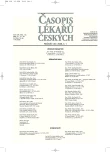-
Medical journals
- Career
Principle and Importance of Using the Array CGH in Hematooncology
Authors: M. Jarošová; H. Pospíšilová; R. Plachý; M. Divoká; M. Holzerová; T. Papajík; J. Koptíková 1; K. Indrák
Authors‘ workplace: Hemato-onkologická klinika LF a FN, Olomouc ; Centrum biostatistiky a analýz LF a PřF MU, Brno 1
Published in: Čas. Lék. čes. 2006; 145: 9-13
Category: Review Article
Overview
Identification of chromosomal changes and variation in DNA copy number allows us to understand pathogenesis of tumors. To the frequently diagnosed chromosomal changes belong acquired gains and losses of chromosomal regions carring genes involved in cellular proliferation and differentiation as well as oncogenes and tumor suppressor genes. The determination of gene changes is limited by techniques used for their identification. The introduction of genom-wide microarray technology, resolution has rapidly increased. Array comparative genomic hybridization (arrayCGH) offers higher resolution for genome-wide detection of chromosomal alteration and it is able to analyze hundreds to thousands of genes presented on microarray in one experiment. The aim of this study was to perform arrayCGH technology and to stress its value for the identification of chromosomal imbalances in hematological malignancies.
Key words:
DNA, in situ hybridization, CGH, arrayCGH, microarray, oncogene, tumor suppressor gene.
Labels
Addictology Allergology and clinical immunology Angiology Audiology Clinical biochemistry Dermatology & STDs Paediatric gastroenterology Paediatric surgery Paediatric cardiology Paediatric neurology Paediatric ENT Paediatric psychiatry Paediatric rheumatology Diabetology Pharmacy Vascular surgery Pain management Dental Hygienist
Article was published inJournal of Czech Physicians

-
All articles in this issue
- Some New Findings in the Pathogenesis of Myeloproliferative Disorders and New Insight into More Effective Treatment
- Principle and Importance of Using the Array CGH in Hematooncology
- Acylation Stimulating Protein – Its Role in Control of Metabolism in the Adipose Tissue
- High Dose Therapy with Autologous Stem Cell Transplantation in Patients with Hodgkin’s Lymphoma: Long Term Follow-up in Patients Treated in One Center
- Importance of Quantitative Evaluation of BCR-ABL Transcripts Using Real-time PCR for Effective Treatment of Chronic Myeloid Leukemia
- Significance of Confirmatory Testing of HLA System in Unrelated Haematopoietic Stem Cell Donors
- The Use of Quantitative Assessment of Wilms Tumour Gene for Monitoring of Residual Disease in Acute Myeloid Leukemia Patients
- Acute Toxicity of High Dose Interstitial Brachytherapy Boost in Prostate Cancer
- Familial Haemophagocytic Lymphohistiocytosis Caused by Perforin Deficit Can Be Successfully Treated by Haematopoietic Stem Cell Transplantation – The First Diagnosed Case in the Czech Republic
- Hydatic Cysts – Echinococcosis
- Abuse of Buprenorphine Becomes a Problem of the Czech Republic
- Robotic Surgery
- Impact Factor – Good Servant, but a Bad Master
- Journal of Czech Physicians
- Journal archive
- Current issue
- Online only
- About the journal
Most read in this issue- Impact Factor – Good Servant, but a Bad Master
- Acute Toxicity of High Dose Interstitial Brachytherapy Boost in Prostate Cancer
- Abuse of Buprenorphine Becomes a Problem of the Czech Republic
- Principle and Importance of Using the Array CGH in Hematooncology
Login#ADS_BOTTOM_SCRIPTS#Forgotten passwordEnter the email address that you registered with. We will send you instructions on how to set a new password.
- Career

